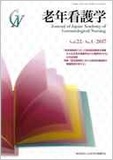Japanese
English
- 販売していません
- Abstract 文献概要
- 参考文献 Reference
抄録
本研究は,積雪寒冷地であるA市在住高齢者の,非積雪期の外出頻度と外出に対する自己効力感との関係を明らかにすることと,外出に対する自己効力感を高める要因を明らかにすることを目的とした.382人を対象として,郵送法による無記名自記式質問紙調査を行った.分析対象者は回答に欠損がない192人(有効回答率50.3%)とした.週1回以上外出している「外出群」は90.1%であった.外出に対する自己効力感に影響を及ぼした要因は,年齢,からだの痛みの有無,健康度自己評価,外出頻度であった.外出頻度と外出に対する自己効力感との関係は,中程度の正の相関を認めた(rs=.531,p=.000).この結果は,東京都で行った先行研究の結果と同様であった.
本研究の結果から,高齢者の外出頻度が増えて,地域で生活を継続するために,看護職の介入としては,健康度自己評価を高める支援とからだの痛みのコントロールに対する支援であることが示唆された.
Objectives : The purpose of this study was to clarify the relation between frequency of going-out and self-efficacy for going-out among older residents of a cold snowy region in the non-snowy season, and to clarify the factors to raise self-efficacy for going-out.
Method : We randomly selected 382 older people from the inhabitants of a city in a cold snowy region, and mailed a questionnaire.
Results : A total of 192 older people were analyzed (response rate 50.3%). Of these people, the proportion of going-out at least once a week was 90.1%. The factors affecting self-efficacy for going-out were “age”, “presence of body pain”, “self-rated health” , and “frequency of going-out”. Relationship between frequency of going-out and self-efficacy for going-out showed moderately positive correlation (rs=.531, p=.000). Conclusions : From the results of this study, it can be seen that going-out frequency is related to self-efficacy for going-out. The results of this study were supported by a survey in Tokyo as well. As for factors to raise self-efficacy for going-out among older residents of such regions, it was suggested that nurses should intervene to support the rise of self-rated health and control of pain of the body.
Copyright © 2017, Japan Academy of Gerontological Nursing All rights reserved.


